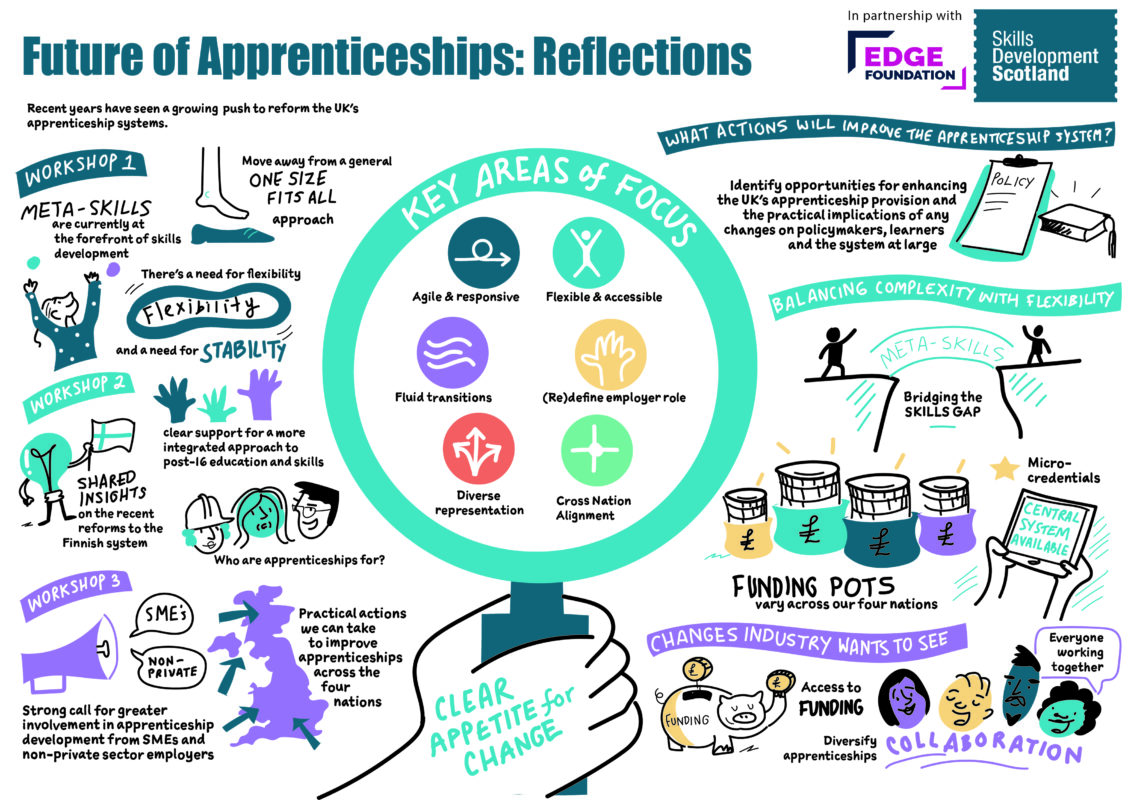Reflections on the Edge/SDS Future of apprenticeship roundtable series

I was privileged to chair the Edge/SDS future of apprenticeship roundtables. This important series brought together representatives from the four nations, as well as international perspectives, to help forge a blueprint for a successful apprenticeship system fit for the challenges we face today and those we may face tomorrow.
My organisation, WorldSkills UK, which operates across the four nations and internationally, has long championed the importance of developing world-class skills to help support the development of high-quality, in-demand apprenticeship programmes which meet the current and future needs of industry. This is driven through our Centre of Excellence network, developed in partnership with NCFE, which disseminates world-class expertise and raises standards across technical and vocational education and training and apprenticeships. And we believe this is vital to help attract the inward investment necessary to help create high-wage jobs in key growth sectors like digital, green tech, advanced manufacturing and life sciences.
And so it was through this lens that I was interested to hear more from participants about how the four nations are approaching the improvement of their apprenticeship systems.

Key themes from the roundtables
There were three key themes to highlight. Firstly, there was a very strong sense, especially with the backdrop of the turbulent economic and political global circumstances, that there is a need for more agility and flexibility in the apprenticeship system to allow employers, individuals and governments to respond to current and future skills needs. This included recognising the value of micro-credentials and the shifting perceptions of employers towards full qualifications and enabling the apprenticeship system to respond through funding and policy levers.
Secondly, essential employability skills, or meta skills, was also a hot topic. It was not only agreed that these are highly relevant to all apprenticeships, regardless of technical or vocational area, but also the need to embed such skills as universal, transferrable skills was key to supporting the resilience of individuals and the workforce at large, equipping them to meet the skills needs of the future and enabling participation in lifelong learning. Prioritising the cultivation of these skills through apprenticeships was therefore recommended as a desirable goal for policy makers to pursue.
Lastly, the issue of equalities was seen as central to apprenticeships. Governments want good outcomes for their citizens, employers want to benefit from the best talent, and individuals want to be empowered to take up opportunities that improve their life chances. The right support, advice and guidance for employers and individuals in accessing apprenticeships are therefore vital to help ensure we have the greatest impact on social mobility and will make a difference to disadvantaged individuals and communities.
How we need to shape the system going forward
In terms of a way forward, there were three areas of convergence. Firstly, it was suggested that supporting apprenticeships in the sectors important for future growth cannot be achieved through reliance on current employer demand alone. There is a role here for policy makers in the four nations to identify where in the economy we want to create more investment and job opportunities and deciding how we best champion that.
Secondly, it was also identified that there is value in learning the lessons from international experience. We were very pleased to have a colleague from Finland share their experiences of apprenticeship reform and some of the challenges that they are facing there. And participants understood the need to adapt those to a UK context through collaborative work between the four nations.
Finally, there was a very clear sense that the tight fiscal environment and global political uncertainties are going to be with us for some time yet. This will inevitably impact spending on training and development, meaning it is ever more important to target spending effectively, building in transferability and resilience into the system and responding quickly to changes.
Conclusion
I was struck by the amount of consensus over the important elements of a successful apprenticeship system and the key areas of focus across the four nations. It was a real pleasure to chair a positive series of discussions that foregrounded the importance of skills and apprenticeships to the life chances of individuals through their role in increasing productivity and boosting economic growth.
The challenge for policy makers is to translate that recognition of their importance into policy frameworks and funding systems that help unlock more opportunities. There is a clear need to join up the dots of access and participation for young people, people of working age, education providers and employers.
There is clearly appetite for greater collaboration between the four nations, to share best practice, and facilitate responsiveness to employer and learner need.
At WorldSkills UK we look forward to working in partnership with the sector to help it happen and provide quality apprenticeship opportunities for all.
By Neil Bentley-Gockmann, CEO of WorldSkills UK











Responses